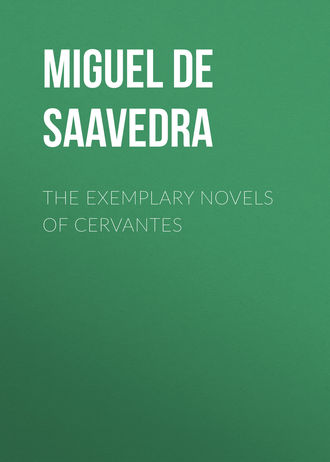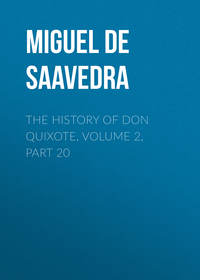 полная версия
полная версияThe Exemplary Novels of Cervantes
Richard knew that this was quite true, but strove to allay their fears in the best way he could. But what availed with them more than all his arguments, was that the wind sprang up again, so that they crowded all sail, and in nine days reached London, from which they had been only a month absent on their cruise. Richard would not enter the port with only joyous demonstrations, on account of the death of his late commander, but mingled signs of grief with them. At one moment bugles rang out cheerily, at the next they were answered by melancholy trumpet notes, and the wailing fife was heard at intervals between the lively rattle of the drum and the clash of arms. From one mast-head hung a Turkish banner reversed, and from another a long black streamer, the ends of which dipped in the water. In this manner he entered the river of London in his English ship, leaving the Portuguese ship at sea, for want of depth of water in the river to float it.
These conflicting demonstrations puzzled the vast multitudes, who observed them from the shore. They easily recognised the smaller vessel as the flag-ship of Baron Lansac; but they could not make out how it was that his second vessel had been exchanged for the large and powerful ship which lay out at sea. But the problem was solved when they saw the valorous Richard jump into his boat, fully equipped in rich and splendid armour. Without waiting for any other escort than that of a vast multitude of the people who followed him, he proceeded on foot to the palace, where the queen was standing in a balcony, waiting for news of the ships, and surrounded by her ladies, among whom was Isabella, dressed in the English style, which became her as well as the Castilian. A messenger, who had anticipated Richard's arrival, had startled her by the announcement of his coming, and she stood watching for him with feelings that fluttered between hope and fear, not knowing whether he had sped well or ill upon his expedition.
Richard was a young man of noble presence, tall and finely proportioned, and he looked to great advantage in a complete suit of Milanese armour all graven and gilded, and instead of a helmet, a wide-leafed fawn coloured hat with Walloon plumes. Thus equipped, and with his spirited bearing, to some he seemed like Mars the god of battles; others, struck by the beauty of his face, compared him to Venus sportively disguised in the armour of that god. When he came before the Queen he knelt, and gave a brief account of his expedition.
"After the sudden death of general de Lansac," he said, "I took his place in pursuance of your Majesty's gracious orders. Shortly afterwards we discovered two Turkish galleys towing a large ship, which we have brought home with us. We attacked them; your Majesty's soldiers fought with great spirit, as they always do, and the corsair galleys went to the bottom. I liberated in your Majesty's royal name the Christians who had escaped out of the hands of the Turks, and sent them away in one of our vessels; and have only brought with me one Spaniard and his wife, who desired of their own accord to come and behold your Majesty's greatness. The great ship we took, is one of those which come from the Portuguese possessions in India; being damaged by a storm, it fell into the power of the Turks, who took it without any difficulty. According to the account given by some of the Portuguese on board the ship, her cargo of spices, and the pearls and diamonds she carries, are worth more than a million. All is untouched, the Turks not having had time to lay hands on anything, and I have given orders that the whole should be presented to your Majesty. There is one jewel alone which, if your Majesty will bestow it upon me, will leave me your debtor for ten other ships. That jewel your Majesty has promised me: it is my Isabella, in obtaining whom I shall be richly rewarded, not only for this service, such as it is, which I have rendered your Majesty, but for many others which I intend to perform in order to repay some part of the incalculable amount which your Majesty will bestow upon me in that jewel."
"Rise, Richard," replied the queen, "and believe me that were I to deliver Isabella to you in the way of bargain at the price at which I value her, you could not pay for her with all the wealth of your prize-ship, nor with what remains in the Indies. I give her to you because I promised to do so, and because she is worthy of you, and you of her; your valour alone entitles you to have her. If you have kept the jewels in the ship for me, I have kept your jewel for you; and though it may seem to you that I do not do much for you in returning to you what is your own, I know that I confer upon you a boon the worth of which is beyond all human computation. Isabella is yours; there she stands; you may claim her when you will, and I believe that it will be with her own consent, for she has the good sense to prize your affection as it deserves. I shall expect you again to-morrow to give me a more detailed account of your exploits, and bring me those two Spaniards who wish to see me, that I may gratify their desire." Richard kissed the queen's hand, and her majesty retired.
The ladies now gathered round Richard, and one of them, the lady Tansi, who had taken a great liking to Isabella, and who was the liveliest and most facetious lady of the court, said to him, "What is all this, sir? Why these arms? Did you, perchance, imagine that you were coming here to fight your enemies? Believe me, you have none but friends here, unless it be the lady Isabella, who, as a Spaniard, is bound to bear you no good will."
"Let her only vouchsafe, Lady Tansi, to have me a little in her thoughts, and I am sure she will not think of me with ill will; for ingratitude can have no place in the heart of one so good, so wise, and so exquisitely fair."
"Since I am to be yours, señor Richard," said Isabella, "claim from me what you will in recompense for the praises you bestow upon me."
Whilst Isabella and the other ladies were thus conversing with Richard, there was a little girl present who did nothing but gaze at him, lift up his cuishes to see what was beneath them, touch his sword, and, with childlike simplicity, peep at her own image reflected in his bright armour. When Richard was gone away, she said, turning to the ladies, "Now I see what a fine thing war must be, since armed men look to such advantage even among ladies." "Look to advantage!" exclaimed Lady Tansi; "one might take Richard for the sun, come down from Heaven, to walk the streets in that garb." Every one laughed at the little girl's remark, and at Lady Tansi's hyperbole; and there lacked not back-biters, who thought his appearing in arms at the palace was an act of great impropriety; but others excused him, saying that it was a very natural and pardonable act of vanity on the part of a gallant young soldier.
Richard was most cordially welcomed by his parents, relations, and friends, and that night there were general rejoicings in London. On his return home, he found Isabella's parents already there, and told his father and mother who they were, but begged they would give no hint of the matter to Isabella till he should make it known to her himself. His desire was punctually observed. That night they began with a great number of boats and barges, and in presence of a multitude of admiring spectators, to unload the great galleon, but eight days were consumed in the work before they had disembowelled it of its aromatic and precious freight. On the following day, Richard went again to the palace, taking with him Isabella's father and mother, dressed in the English style, telling them that the queen wished to see them. They found the queen surrounded by her ladies, with Isabella by her side, wearing, by the queen's desire, for Richard's special gratification, the same dress in which she had made her first appearance at court. Isabella's parents were filled with admiration and astonishment at such a display of grandeur and gaiety combined. They looked at Isabella, but did not recognise her, though their hearts, prophetic of the happiness so near at hand, began to throb, not anxiously, but with an emotion of joy for which they could not account.
The queen would not allow Richard to kneel before her, but made him rise and be seated on a chair which was placed for him alone, an unusual favour, which provoked many envious comments. "It is not on a chair he sits," said one, "but on the pepper he has brought." "It is a true saying," remarked another, "that gifts can soften rocks, since they have mollified the hard heart of our queen." "He sits at his ease," said a third, "but there are those who will make bold to push him from his seat." In fact, that new mark of honour which the queen bestowed on Richard gave occasion to many to regard him with envy and malice; for there is no favour which the sovereign bestows on a subject but pierces the heart of the envious like a lance. In obedience to the queen's command, Richard narrated more minutely the details of his conflict with the corsairs, attributing the victory to God, and to the arms of her valiant soldiers. He extolled them all collectively, and made special mention of some who had particularly distinguished themselves, in order that the queen might reward them all and singly. When he came to speak of his having, in her majesty's name, set the Turks and Christians at liberty, he said, pointing to Isabella's parents, "These are the persons of whom I spoke yesterday to your majesty, who, desiring to behold your greatness, earnestly besought me to bring them away with me. They are from Cadiz, and from what they have told me, and from what I have myself observed, I am assured that they are persons of worth and quality."
The queen commanded them to approach her. Isabella raised her eyes to look at persons who she heard were Spaniards, and, above all, from Cadiz, longing to know if perchance they were acquainted with her parents. Her mother first encountered her gaze, and as she looked attentively at her, there rose on her mind some shadowy confused reminiscences that seemed to intimate she had seen that face before. Her father was in the same wavering state of mind, not daring to believe the evidence of his eyes, whilst Richard watched intently the workings of their perplexed and dubious souls. The queen too noticed the emotion of the two strangers, and also Isabella's uneasiness, for she saw her often raise her hand to her forehead, which was bedewed with perspiration. Whilst Isabella was longing that the person she imagined to be her mother would speak, thinking that the sound of her voice would resolve her doubts, the queen commanded her to ask the strangers in Spanish what had induced them voluntarily to forego the freedom which Richard had offered them, since freedom was the thing most prized, not only by reasonable creatures, but even by irrational animals. Isabella put this question to her mother, who, without answering a word, rushed abruptly and almost totteringly to Isabella, and forgetting all respect of place or circumstances, put her hand to her daughter's right ear, and discovered a dark mole behind it. Assured now beyond all doubt that Isabella was her daughter, she cried out, "Child of my heart! treasure of my soul!" and swooned in her arms. The father, no less tender hearted but with more self-command, gave no other token of his feelings than the tears that streamed down his venerable face and beard. With her lips pressed upon her mother's, Isabella bent her eyes upon her father, with looks that spoke the gladness of her soul.
The queen was greatly affected by this touching scene, and said to Richard, "I know not whether you have done wisely in contriving this meeting, for sudden joy, it is known, can kill as well as grief." Then, turning to Isabella, she withdrew her from her mother, who, after her face had been sprinkled with water, came to her senses, and recollecting herself a little better, fell on her knees before the queen, entreating her majesty's pardon. Elizabeth graciously replied, and commanded that the two strangers should take up their abode in the palace, that they might have the more opportunity of rejoicing in their daughter's society. Richard then renewed his request that the queen would fulfil her promise, and bestow Isabella upon him, if so it were that he had deserved her, but if not, he begged to be sent where he might find opportunities of doing so.
The queen was well aware that Richard was well satisfied with himself, and that there was no need of putting him to further proof; she told him, therefore, that in four days he should obtain the object of his desires, and that she would honour their union with her royal countenance. Richard then took his leave of her majesty, his heart swelling with joy at the near prospect of Isabella becoming his own for ever. Time sped, but not with the nimbleness he desired; for those who live on the hopes of pleasure to come, always imagine that time does not fly, but hobbles on the feet of sloth itself. At last the day came on which Richard expected, not to end his desires, but to find in Isabella new graces which should make him love her more, if more was possible. But in that brief space of time, in which he thought the bark of his fortunes was running with a prosperous gale towards the desired haven, it encountered such a fearful tempest, as a thousand times threatened it with wreck.
The queen's keeper of the robes, who had charge of Isabella, had a son aged two-and-twenty, named Count Ernest, whom his great wealth, his high blood, and his mother's great favour with the queen, made too arrogant and overbearing. He fell most violently in love with Isabella, and, during Richard's absence, he had made some overtures to her which she had coldly disregarded. Although repugnance and disdain manifested at the outset usually make the enamoured desist from their suit, yet Isabella's notorious disdain had the contrary effect on Ernest, for it fired his passion, and consumed his sense of honour. He was almost distracted when he found that the queen had adjudged Isabella to Richard, and that she was so soon to become his; but before he committed himself to the infamous and dastardly course which he ultimately adopted, he first besought his mother to use her influence with the queen on his behalf, declaring that his death was at hand unless he obtained Isabella for his wife.
The countess, well knowing her son's violent and arrogant disposition, and the obstinacy with which he pursued his desires, had reason to fear that his passion would lead to some unhappy result. With a mother's natural anxiety to gratify her son's wishes, she promised to speak to the queen, not with the hope of succeeding in the impossible attempt to make her majesty break her word, but in order not to sit down in despair, while any remedy remained to be tried. That morning Isabella was dressed by the queen's orders with a magnificence which defies description. With her own hands her majesty put on her neck a string of the largest pearls found in the galleon, valued at twenty thousand ducats, and a diamond ring on her finger worth six thousand crowns. But whilst the ladies were in great glee anticipating the glad time so near at hand, the keeper of the robes presented herself before the queen, and implored her on her knees to postpone Isabella's wedding for two days longer, declaring that if her majesty would only do so, it would more than reward her for all her past services. The queen desired to know, in the first instance, why she made that request, so directly at variance with the royal promise given to Richard; but the countess would not explain until the queen, urged by curiosity to discover the cause of this strange request, promised that she would grant it. Having thus succeeded in her immediate object, the lady keeper made the queen acquainted with her son's passion, and how, fearing that unless he obtained Isabella he would commit some desperate deed against himself or others, she had asked for that delay of two days in order that her majesty might devise the best means of saving the life of her son. The queen replied that had she not pledged her royal word, she would have found a way to smooth over that difficulty, but that, for no consideration, could she retract her promise or defraud Richard of the hope she had given him.
The lady keeper reported the queen's answer to her son, but nothing could overcome his headstrong presumption. Arming himself at all points he mounted a powerful charger, and presented himself before Clotald's house, and shouted for Richard to come to the window. Richard was dressed as a bridegroom, and was on the point of setting out for the palace with his friends, but hearing himself thus summoned, he went with some surprise and showed himself at an open window. "Hark you, Richard; I have something to say to you," said Count Ernest. "Our lady the queen ordered you to go forth on her service and perform exploits that should render you worthy of the peerless Isabella. You set out, and returned with ships laden with wealth, with which you think you have bought your title to Isabella. But though our lady the queen promised her to you, it was under the belief that there was no one at her court who could serve her better than you, or more justly aspire to the fair Spaniard's hand; but in this it may be that her majesty was mistaken. Being of that opinion, and holding it for very truth, I say that you have done no such deeds as can make you worthy of Isabella, nor can you ever perform any to raise you to that honour; and if you dare to maintain the contrary, I defy you to the death."
"I am in no wise called upon to take up your defial," replied Richard; "because I confess not only that I do not merit Isabella, but that no man living does so. Confessing, therefore, the truth of what you allege, I say again, that your defial touches not me; nevertheless, I accept it in order to chastise your insolence." So saying, he left the window and called for his arms.
Richard's family and the friends who had assembled to escort him to the palace were thrown into confusion by this untoward incident. The challenge having been so publicly given, it could not be but that some one should report it to the queen. This was done accordingly, and her majesty ordered the captain of her guard to arrest Count Ernest. The captain made such good speed that he arrived just as Richard was riding out from his father's house, mounted on a handsome steed, and equipped with the magnificent arms in which he had gone to pay his respects to the queen on his return from his expedition. The moment the count saw the captain of the queen's guard, he guessed his purpose, and resolving not to let himself be caught, he shouted out, "You see, Richard, how we are interrupted. If you are bent upon chastising me, you will look for me as I will look for you. Two people surely meet when they have a mind." "The sooner the better," said Richard. Meanwhile, the captain of the guards came up and, in the queen's name, arrested the count, who surrendered, requesting to be taken into the queen's presence. The captain complied, and carried Ernest before the queen, who, without entering into any discourse with him, ordered that he should surrender his sword and be committed to the Tower.
All these things were torture to the heart of Isabella and to her parents, who saw their new-found happiness so soon disturbed. The lady keeper advised the queen that to prevent the mischief which might break out between her own family and Richard's, the possible cause of it should be withdrawn, by sending Isabella to Spain. In support of this suggestion she added that Isabella was a Catholic, and so rooted in that faith, that all the arguments and persuasions she had used to withdraw her from it, and they were many, were of no avail. The queen replied that she esteemed her the more, since she was steadfast to the law taught her by her parents; and that as for sending her to Spain, it was not to be thought of, for she was charmed with her lovely presence and her many graces and virtues. In fine, the queen was resolved that Isabella should become Richard's wife, if not that day, on another, without fail. The lady keeper was so mortified by this reply that she withdrew without saying a word; and having already made up her mind that unless Isabella was removed there could be no hope of relief for her son or of peace between him and Richard, she determined to commit one of the most atrocious acts that could enter the mind of a lady of her exalted station.
Women being, for the most part, rash and sudden in the execution of their resolves, the lady keeper that evening gave Isabella poison in a conserve which she pressed her to take, under the pretence that it was good for the sinking and oppression of the heart which she complained of. A short while after Isabella had swallowed it her throat and tongue began to swell, her lips turned black, her voice became hoarse, her eyes fixed and glassy, and her breathing laboured and stertorous: in short, she exhibited all the symptoms of having been poisoned. The queen's ladies hastened to inform her majesty, assuring her that the lady keeper had been the author of the nefarious deed.
The queen had no great difficulty in coming to the same conclusion, and went at once to see Isabella, who seemed to be almost at the last gasp. Sending with all speed for her physicians, she, meanwhile, ordered that the sufferer should be given a quantity of powdered unicorn's horn and several other antidotes, with which great princes are usually provided against such casualties. The physicians arrived and begged the queen to make the lady keeper declare what kind of poison she had used (for no one doubted that she was the poisoner). This information having been obtained from the criminal, the physician applied the proper remedies with such good effect that, with God's help, Isabella's life was saved, or at least there was a hope that it would be so.
The queen ordered that the lady keeper should be arrested and confined in a chamber of the palace, intending to punish her as her crime deserved; whilst the guilty woman thought to excuse herself by saying that in killing Isabella she offered an acceptable sacrifice to heaven by ridding the world of a Catholic, and removing with her the cause of affliction to her son. Finally, Isabella did not die; but she escaped only with the loss of her hair, eyebrows, and eyelashes, her face swollen, her bloom gone, her skin blotched and blistered, and her eyes red and humid. In a word, she was now become an object as loathsome to look at as she had before been surpassingly beautiful. The change was so frightful that those who knew her thought it would have been better had the poison killed her. But notwithstanding all this, Richard supplicated the queen to let him take her home with him, for the great love he bore her comprehended not only her body but her soul, and if Isabella had lost her beauty, she could not have lost her infinite virtues. "Be it so," said the queen. "Take her, Richard, and reckon that you take in her a most precious jewel, in a rough wooden casket. God knows how gladly I would give her to you as I received her; but since that is impossible, perhaps the punishment I will inflict on the perpetrator of the crime will be some satisfaction to your feelings."
Richard spoke earnestly in the culprit's behalf, and besought her majesty to pardon her. Finally, Isabella and her parents were consigned to his care, and he took them home to his father's house, the queen having added to the fine pearls and the diamonds she had bestowed on Isabella other jewels and rich dresses, such as manifested the great affection she felt for her. Isabella remained for two months in the same state, without the least sign appearing that her beauty would ever return; but at the end of that time her skin began to peel off, and she gradually recovered the natural bloom of her lovely complexion. Meanwhile, Richard's parents, thinking it impossible that Isabella should ever again be what she had been, determined to send for the Scotch lady, to whom they had at first intended to unite him. They did not doubt that the actual beauty of the new bride would make their son forget the lost beauty of her rival, whom they intended to send to Spain with her parents, giving them so much wealth as would compensate them for their past losses. All this was settled between them without Richard's knowledge, and soon after the new bride entered their doors, duly accompanied, and so beautiful that none could compare with her in London, now that Isabella's charms were gone.









